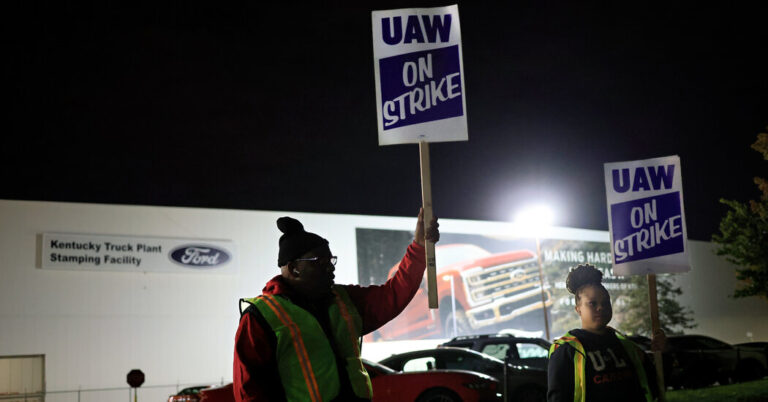Ford Motor Co. said Thursday it cannot improve its contract offer to the United Auto Workers without jeopardizing its business and ability to invest in electric vehicles.
The company also said the union’s decision to extend the strike to the Kentucky Truck Plant, Ford’s largest plant, would likely harm workers at other plants and lead to layoffs across the auto industry. .
“We’re clear,” Kumar Galhotra, president of Ford’s internal combustion engine vehicle manufacturing unit, said on a conference call with reporters. “We’re at a breaking point. Any more and we’re maxing out our ability to invest in the business.”
The UAW is negotiating new labor contracts with Ford, General Motors, Chrysler and Jeep’s parent company, Stellantis. Union members attacked some factories and parts warehouses owned by the three companies. Negotiations with Ford broke down Wednesday, and the union responded by demanding that Kentucky Trucking’s 8,700 UAW workers be fired.
“If companies are not willing to come to the table and address the needs of our members, we will respond,” UAW President Sean Fein said in an online video after the Kentucky strike was announced.
Production at the Louisville factory stopped Wednesday night. The plant builds the Super Duty version of Ford’s F-Series pickup trucks, as well as the Ford Expedition and Lincoln Navigator full-size sport utility vehicles.
The Kentucky truck plant itself generates about 16% of Ford’s total revenue. Typically, a new vehicle rolls off the assembly line every 37 seconds.
The plant is so large that prolonged idling would likely cause shutdowns and layoffs at up to 13 other Ford plants that make engines, transmissions and axles. Galhotra said factories owned by the 600 suppliers that supply parts to Ford may also have to lay off workers.
“This doesn’t just hurt Ford’s profits,” he said.
The UAW is calling for significant wage increases, as well as cost-of-living benefits, expanded retirement plans, improved medical benefits for retirees and job security as automakers shift to producing electric vehicles. It also wants to eliminate a system in which new employees start at just over half of the UAW’s maximum wage of $32 an hour.
Ford proposed raising wages by 23% over four years, adjusting wages for inflation and shortening the time it takes for new employees to earn the top wage from eight to four years.
The union said the UAW entered negotiations on Wednesday in hopes that Ford would soften its offer. Galhotra said Ford is open to discussing adjustments to existing proposals, but he does not intend to make an entirely new proposal.
Differences between the two sides quickly became apparent, and Mr. Fein ordered Ford workers at the Kentucky plant to go on strike, union and company officials said. Mr. Fein and other union negotiators left the meeting minutes after it began.
“Unfortunately, we have had to further escalate our actions,” Fein said in the video. “We came here today to get another offer from Ford, and they gave us the exact same offer as two weeks ago.”
